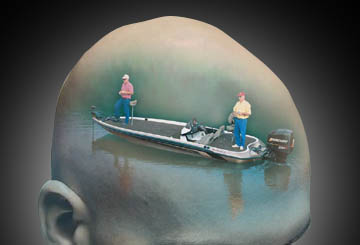Levels of the Game: Goal-setting

Communicating effectively, in fishing as elsewhere, is a complex challenge. It is always important to be clear and concise, and good communicators present their message so that their audience can easily understand it. However, sometimes one’s audience includes many types of people with markedly different levels of knowledge of the topic at hand.
“Levels of the Game,” by American author John McPhee, describes the stages of competitive tennis through the career of the late Arthur Ashe. With acknowledgments to McPhee’s fine book, that title will serve as the context for this year’s “Performance Psychology and Tournament Fishing” columns. That means that each ensuing episode will present a key performance-psychology dimension at three levels: beginner, intermediate and advanced. Attention to clarity will remain, though with three levels of explanation and illustration, there should be something for each reader, regardless of current commitment or skill level.
Goal-setting: Beginner level
The basic concept is this: People who set specific goals are more likely to realize success than those who don’t. Trust me on this. 50 years of research clearly demonstrates that specific, measurable goals will focus your attention and keep you motivated in ways that vague goals or the absence of goals will not.
If you are a competitive-fishing rookie, or if you just fish for fun, consider what you want to have happen this coming season. Let’s say you’re going to fish four small local tournaments this year, and you hope to have a respectable finish. OK, ask yourself what “respectable” means to you. Do you expect to catch a limit of fish every tournament, or do you want to catch a certain weight each time out? Maybe you merely hope to contribute a fish or three to your pro’s total in the Pro-Am total-weight events you enter.
Whatever you decide on for your 2009 fishing goals, get some paper, or better yet a notebook, and write down your goals. You might also want to check out this article on goal-setting from the Performance Psychology and Tournament Fishing archives. Even basic goals will help keep you pointed in the right direction. They will also give you a benchmark against which to compare this year’s performance at the end of the season; this will allow you to set better, more specific goals for next year.
Goal-setting: Intermediate level
At the intermediate level, you already know that goal-setting works. You have set some goals for yourself in the past, and over the last few years, you have seen your performance improve. Perhaps your increases were not the same every year, but there was enough movement in the positive direction over a three- or four-year time frame to feel confident that setting goals was worth the effort.
To move your goal-setting to the next level, begin by writing down five or six specific, measurable objectives for 2009, just like you do every year. Perhaps in the past you only made one or two goals, so be more aggressive this year and make at least half a dozen.
Now, for each goal, think of three or four specific steps you might take to increase the likelihood you will attain that goal. For example, maybe you are already a good shallow-water fisherman, and one goal for 2009 is to be more effective in summer when fish move to deep weedlines and ledges. Specific steps you could take would include spending more time looking for deep-water spots or refining your sonar-reading capabilities to differentiate weed changes and bottom composition fluctuations. You might also talk to deep-water experts, locally or online, and get their opinions on specific crankbaits, jigs or drop-shot rigs they find useful. Remember, a goal with an action plan is always better than a goal all by itself.
Goal-setting: Advanced level
For top-shelf anglers who already use complex goal-setting with specific plans and action steps, consider adding one or two mental goals to your list of objectives for 2009. You’ve probably already set specific outcome goals as well as technique goals for yourself. You looked at last year’s performance, identified some areas that needed improvement, and created goals and plans to address these. Good for you!
Olympic competitors are remarkably committed to using performance-psychology techniques. They regularly set mental goals to improve visualization, cognitive rehearsal and stress management. To move to an elite level in your sport, you should do the same thing.
Consider visualization, for example. Forty years ago, almost no one in competitive golf, other than Jack Nicklaus, valued visualization. Now competitive golfers in high school, as well as at collegiate, Olympic and professional levels, regularly employ this technique. Why? Because it works! Competitive anglers have been slow to experiment with, and appreciate the usefulness of, visualization. If you decide to practice visualization this year, you’ll be ahead of your competitors – and isn’t that what you’re looking for – an edge, a technique, or a lure they don’t have? Well, visualization is one they could, but probably don’t, use.
(Inside tip: When you visualize a precise mechanical technique like skipping baits under boat docks, don’t visualize the bait skipping across the water. Instead, visualize your best arm movement and wrist snap that sends the bait underneath the overhanging dock. Recent psychology research shows that visualizing the specific body motion rather than the outcome leads to greater success.)
So there you have it: beginner, intermediate and advanced level examples of goal-setting. And if you’re still not convinced about the value of performance-psychology variables, call my Minnesota connection Larry Fitzgerald of the Arizona Cardinals and ask him about the usefulness of concentration exercises!

————————————————–
Jay T. McNamara, Ph.D., L.P., also known as Dr. Fish, recently finished his book “The Psychology of Exceptional Fishing.” You can order it by contacting Jay via e-mail at this address: [email protected].
————————————————–
Jay T. McNamara, Ph.D., L.P., is a psychologist, who is also an avid bass and walleye angler. With more than 26 years of professional experience complemented by participation in competitive fishing at local and national levels, he is uniquely qualified to illustrate how performance psychology principles apply to tournament fishing.